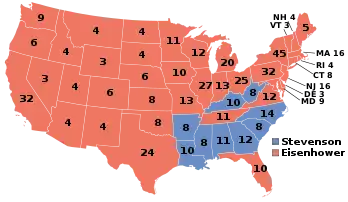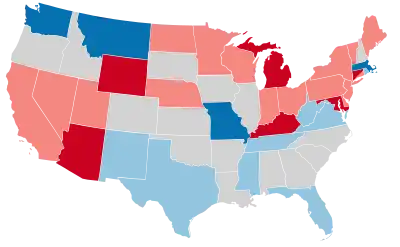1952 United States elections
The 1952 United States elections were held on November 4, 1952. The Republicans took control of the presidency and both chambers of Congress for the first time since the Great Depression. The election took place during the Korean War.
| Presidential election year | |
| Election day | November 4 |
|---|---|
| Incumbent president | Harry S. Truman (Democratic) |
| Next Congress | 83rd |
| Presidential election | |
| Partisan control | Republican gain |
| Popular vote margin | Republican +10.9% |
| Electoral vote | |
| Dwight D. Eisenhower (R) | 442 |
| Adlai Stevenson (D) | 89 |
 | |
| 1952 presidential election results. Red denotes states won by Eisenhower, blue denotes states won by Stevenson. Numbers indicate the electoral votes won by each candidate. | |
| Senate elections | |
| Overall control | Republican gain |
| Seats contested | 35 of 96 seats (32 Class 1 seats + 4 special elections)[1] |
| Net seat change | Republican +2[2] |
 | |
| 1952 Senate results
Democratic gain Democratic hold | |
| House elections | |
| Overall control | Republican gain |
| Seats contested | All 435 voting members |
| Popular vote margin | Democratic +0.5% |
| Net seat change | Republican +22 |
| Gubernatorial elections | |
| Seats contested | 30 |
| Net seat change | Republican +5 |
 | |
| 1952 gubernatorial election results
Democratic gain Democratic hold | |
Republican nominee Five-star general Dwight D. Eisenhower defeated Democratic Governor Adlai Stevenson of Illinois.[3][4] Eisenhower won the popular vote by eleven points, and carried every state outside the South. Eisenhower took the Republican nomination on the first ballot, defeating Ohio Senator Robert A. Taft and California Governor Earl Warren. After incumbent president Harry S. Truman declined to seek re-election, Stevenson won the Democratic nomination on the third ballot, defeating Tennessee Senator Estes Kefauver, Georgia Senator Richard Russell Jr., and former Commerce Secretary W. Averell Harriman. Eisenhower was the first professional soldier to be elected president since Ulysses S. Grant.
The Republicans gained twenty-two seats in the U.S. House of Representatives, gaining a majority over the Democrats. The House elections took place after the 1950 United States Census and the subsequent Congressional re-apportionment. The Republicans also became the majority in the U.S. Senate, gaining two seats.[4]
To date, 1952 is the last time both houses of Congress and the Presidency have all flipped in the same election, and it would be the last time the Republicans won the Senate Majority until 1980 and the last time they would win the House Majority until 1994.
See also
References
- The Class 1 Senate seat in Michigan held both a regularly-scheduled election and a special election in 1952. This seat is not double-counted for the total number of seats contested.
- Republicans picked up one seat in the regularly-scheduled elections and picked up an additional seat in the special elections.
- "1952 Presidential Election". The American Presidency Project. Retrieved 27 December 2011.
- "Statistics of the Presidential and Congressional election of November 4, 1952" (PDF). U.S. House of Reps, Office of the Clerk. Retrieved 27 December 2011.